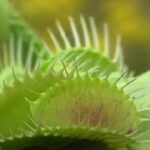As an Amazon Associate, this site earns commissions from qualifying purchases. For more details, click here.
We know Venus flytraps consume gnats, spiders, flies and other insects, but what else can it eat? Can this plant eat anything you give it? This is a critical question because it will determine the health of your Venus flytrap.
The best foods for Venus flytraps are small insects, spiders, grasshoppers, mealworms and bloodworms. Venus flytraps cannot eat fruits, hamburgers or any kind of human food.
Can Venus Flytraps Eat Human Food?
One of the most common questions you will see is “can Venus flytraps eat hamburger?” Since these are carnivorous plants, they should be able to eat any kind of meat right?
Venus flytraps cannot eat hamburger because their digestive system is unable to process them. The proteins and carbohydrates in these meats are not compatible with the plant enzymes and could result in trap rot.
Processed food like burgers, cheese, bacon, chocolate etc. are filled with protein, fiber, carbohydrates, vitamins and minerals. Our digestive system have evolved so it can process these.
When we digest those foods, our bodies absorb the nutrients and supply us with the energy we need for our daily activities.
Venus flytraps catch and eat insects for the same reason humans eat food. Once an insect is trapped, the plant releases enzymes that dissolve the tissues, allowing the Venus flytrap to absorb its nitrogen and other nutrients.
Nitrogen is required by the plant for extra nutrients. It does not need insects to live, which is why Venus flytraps are autotrophs, but they do benefit from the nutrients insects provide.
Their digestive juices are only capable of breaking down small bits of meat from insects. If you put hamburger meat in the trap and close it, either of two things will happen.
One, the plant will not eat the meat, so it will just rot there. Two, the plant will attempt to digest the meat.
Hamburger meat is rich proteins, good for humans but not Venus flytraps. The proteins, carbs and sugars will likely cause the trap to rot.
Think of what happens to us when we eat something that our stomach does not agree with. It is an unpleasant experience, and it can even be fatal. The same thing with plants. Some human foods might just kill a trap or it could damage the entire plant.
Can Venus Flytraps Eat Fruits?
Venus flytraps cannot eat fruits. Fruits do not possess the nutrients Venus flytraps need and the sugars in them might lead to rotting.
Some Venus flytrap owners want to give their plant different types of food. This stems as much from a desire to experiment as well as make sure the plant receives proper nourishment.
Fruits often come up at his point. A lot of carnivores eat fruits, and while a Venus flytrap is an autotroph, it does consume meat. So why can’t a Venus flytrap have a bite of apple?
There are three reasons: Fruits do not have the nutrients, they cannot activate the trap and the sugary content could cause health issues.
Why Fruits are Bad For Venus Flytraps
First, the traps of a Venus flytrap are triggered by living organisms. If you put apple bits in the trap, it will not stimulate the trigger sensors. Not unless you poke the trap gently with something.
Second, fruits do not have the nutrients the plant is looking for. Carnivorous plants catch insects because they have nitrogen and other important elements.
These nutrients are transformed into amino acids and other compounds Venus flytraps use to fuel their growth. Fruits do not carry these elements. Even if you can get the trap to close over fruit bits, it will not do the plant any good.
Third, and most importantly, the sugars in fruits might be dangerous for Venus flytraps. Their digestive enzymes have evolved to consume insects, caterpillars, worms, crickets and various insects, but not apples, oranges, grapes etc.
Since Venus flytraps cannot digest the fruit, it will just rot in the trap, and the sugars could spread all over the Venus flytrap. The trap might also open unharmed after a few days, but why risk it?
If you want to give Venus flytraps alternative food, try freeze dried worms like the ones made by San Francisco Bay as this is ideal for these carnivorous plants.
Can Venus Flytraps Eat Fish Food?
Fish pellets, flakes and freeze dried mealworms are good for Venus flytraps. Grind the food into small bits and add some drops of water, then you can put them in the trap.
Mealworms and bloodworms are healthy foods for Venus flytraps. Fish pellets are good too, and you can switch back and forth between worms and pellets.
Venus flytraps can also digest fish flakes if they are small enough. Just grind them into bits and put a small amount in one of the traps. The trap should not be filled more than a third of the way through.
Only one trap of a Venus flytrap should be given fish food at a time, or any food for that matter. There are many types of fish flakes but Tetra Mix Fish Flakes is one of the best options.
Use tweezers or toothpicks to stimulate the trap. Venus flytraps will only close if it senses a living organism, so you have to do some gentle poking to get the traps closed.
You are probably asking why Venus flytraps can eat fish food, and is it any good for them?
Based on the experiences of various Venus flytrap owners, the answer is yes, fish food is good for these plants.
Venus flytraps fed with fish pellets often exhibit healthy growth. If your plants are indoors and there are not too many flying insects around, fish food is a good option.
The important thing to remember is not to overfeed Venus flytraps. It is easy to be carried away and give the traps some mealworms, bloodworms, spiders, fish flakes etc.
Too much food will kill the traps. In the worst case scenario it could kill the plant. So feed it only every two or four weeks. And you should not feed Venus flytraps when they are dormant.
What Other Foods Can a Venus Flytrap Eat?
Venus flytraps can consume caterpillars, slugs, crickets, gnats, flies and other insects. They should not be given butterflies, beetles, moths (except small ones), cockroaches (unless it is small) or other large bugs.
Venus flytraps in the wild eat ants, and usually it is not a problem. But larger ants can eat their way out of the leaves, so they are best left for Venus flytraps with large traps.
A note about caterpillars; they are among the best natural foods for Venus flytraps. Unfortunately some of them are known to chew through a trap, so make sure the one you provide is small.
Some wasps can damage traps but like ants, it varies from plant to plant. If your flytrap is small, avoid wasps.
Never give Venus flytraps beetles or any insect with a hard exoskeleton. Butterflies and adult moths are too large and can rip through the traps. Do not give Venus flytraps adult cockroaches or fireflies either.
Here are some simple guidelines to keep in mind.
- If your Venus flytrap is outdoors, it can take care of itself, food wise. There are lots of insects readily present.
- Venus flytraps cannot just eat anything. They only need sources of nitrogen and other nutrients, which they usually get from flying insects like flies and also arachnids.
- If you want to give them something other than insects, freeze dried mealworms are the best option. Bloodworms are also healthy for Venus flytraps, but not earthworms.
- Worms are fish food, but they are not the only ones you can give to carnivorous plants. Fish pellets and flakes are also recommended as long as they are chopped into small bits.
- The rule of thumb is to never fill the trap. One third full is enough. If your Venus flytrap has a large trap then you can add more, but the 1/3 rule works fine most of the time.
Conclusion
Venus flytraps are fascinating precisely because they eat insects. But that does not mean we should feed them just any type of meat. As has been shown here, these plants need proper foods and nutrients to grow.

My fascination with carnivorous plants began many, many years ago with Venus Fly Traps. Now I am more than happy to impart what I know with other enthusiasts and those who are curious about meat eating plants.



